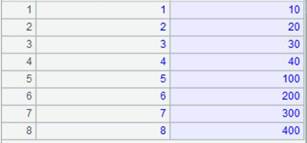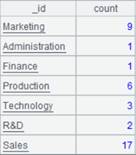mongo_shell()
Description:
Query MongoDB database and return a table sequence.
Syntax:
mongo_shell(fd,s)
Note:
The
external library function (See External Library Guide) queries
data in a MongoDB database and returns the table sequence in the outermost
layer.
Option:
|
@e |
Go on with the execution when error appears and return the error information. |
|
@d |
Return a table sequence. |
|
@c |
Return a cursor; should be used together with @d option. |
Parameter:
|
fd |
MongoDB connection object. |
|
s |
A JSON string that is equivalent to parameter str in db.runCommand(str) . |
Return value:
Table sequence
Example:
|
|
A |
|
|
|
1 |
=mongo_open("mongodb://localhost:27017/mydb") |
Connect to database mydb on Mongo server. |
|
|
2 |
=mongo_shell(A1,"{'find':'emp'}")
|
Return the outermost table sequence.
|
|
|
3 |
=mongo_shell(A1,"{'find':'emp'}") |
Query all records of the emp set and return a table sequence.
|
|
|
4 |
=mongo_shell(A1,"{'find':'emp',filter:{GENDER:'F'}}") |
Query records where GENDER is F and return a cursor. |
|
|
5 |
=A4.fetch() |
|
|
|
6 |
=mongo_shell@d(A1,"{'find':'emp',projection:{NAME:1,DEPT:1,SALARY:1},sort:{SALARY:1}}") |
Display a table sequence consisting of NAME field, DEPT field and SALARY field and sorted by SALARY in ascending order.
|
|
|
7 |
=mongo_shell(A1,"{'count':'emp'}") |
Count records in emp:
|
|
|
8 |
=mongo_shell(A1,"{'distinct':'emp',key:'DEPT'}") |
Get unique DEPT field values from emp.
|
|
|
9 |
=mongo_shell@d(A1,"{'aggregate':'emp',pipeline: [{'$group':{'_id':'$DEPT','count':{'$sum':1}}}],cursor: { }}") |
|
Compute the number of employees in each department:
|
|
10 |
=mongo_close(A1) |
Close the database connection. |
|



